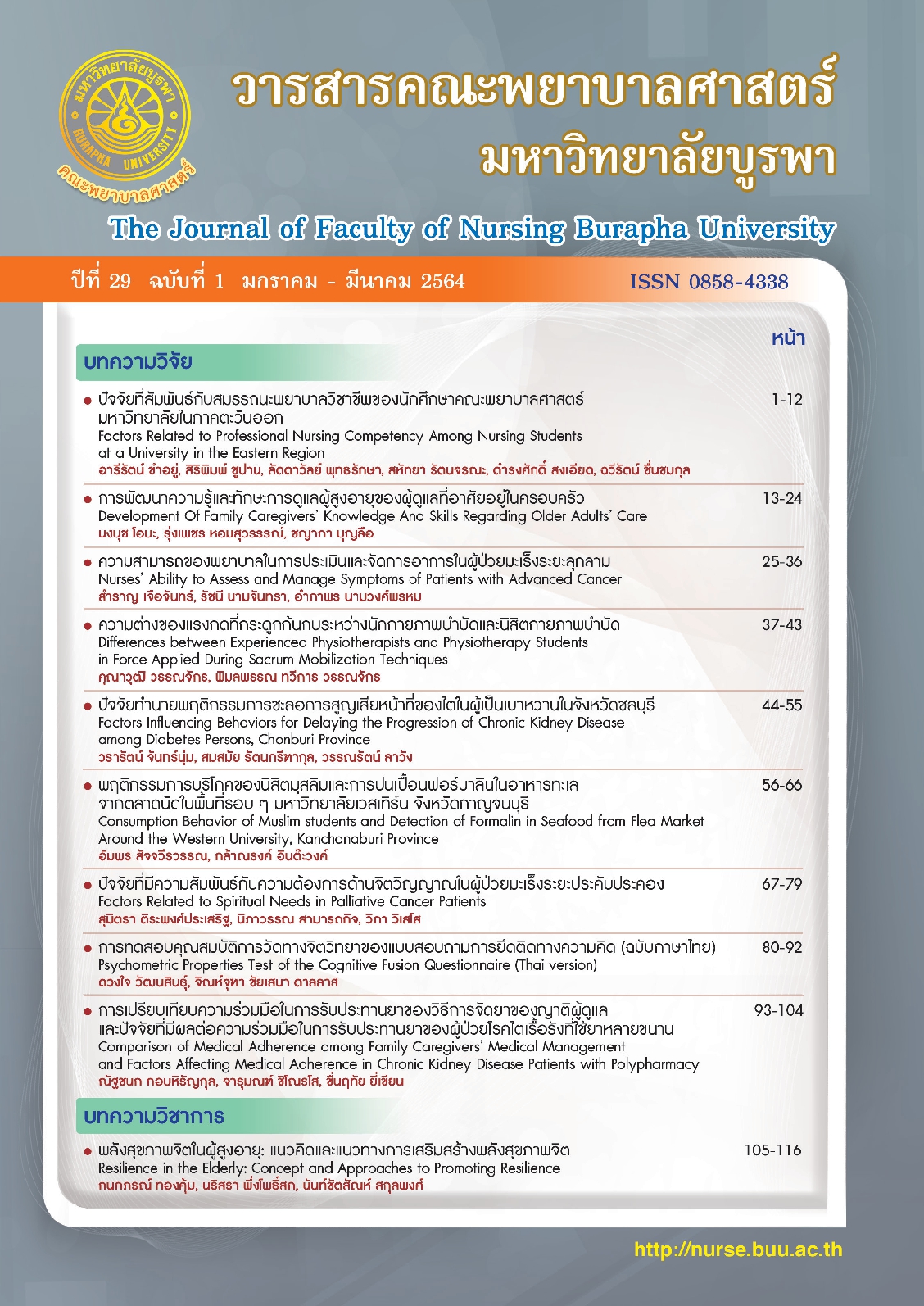ความสามารถของพยาบาลในการประเมินและจัดการอาการในผู้ป่วยมะเร็งระยะลุกลาม
คำสำคัญ:
มะเร็งระยะลุกลาม, ความสามารถของพยาบาล, การประเมินอาการ, การจัดการอาการบทคัดย่อ
การวิจัยเชิงพรรณนาแบบหาความสัมพันธ์นี้ มีวัตถุประสงค์เพื่อศึกษาความสามารถในกำรประเมินและจัดการอาการที่พบบ่อยในผู้ป่วยมะเร็งระยะลุกลามตามการรับรู้ของพยาบาล และศึกษาความสัมพันธ์ระหว่างความสำมารถด้านความรู้และด้านการปฏิบัติในการประเมินและจัดการอาการ กลุ่มตัวอย่างเป็นพยาบาลวิชาชีพที่ดูแลผู้ป่วยมะเร็งที่เข้าพักรักษาตัวในโรงพยาบาลจุฬาภรณ์ 85 คน เก็บข้อมูลโดยใช้แบบบันทึกข้อมูลส่วนบุคคล และแบบสอบถามการรับรู้ความสามารถของพยาบาลในการประเมินและจัดการอาการของผู้ป่วยมะเร็งระยะลุกลำม วิเคราะห์ข้อมูลโดยใช้สถิติเชิงบรรยายและสถิติสหสัมพันธ์แบบสเปียร์แมน
ผลการวิจัยพบว่าพยาบาลรับรู้ความสามารถโดยรวม ด้านความรู้ และด้านการปฏิบัติในการประเมินและจัดการอาการของผู้ป่วยมะเร็งระยะลุกลามในระดับปานกลาง โดยมีคะแนนเฉลี่ยความสามารถโดยรวมสูงสุดเกี่ยวกับอาการปวดท้องผูก และคลื่นไส้อาเจียน มีคะแนนเฉลี่ยความสำมารถด้านความรู้และด้ำนการปฏิบัติสูงสุดเกี่ยวกับอาการปวดท้องผูก และวิตกกังวล และมีคะแนนเฉลี่ยความสามารถโดยรวม ด้านความรู้ และด้านการปฏิบัติต่ำสุดเกี่ยวกับอาการปากแห้ง เหนื่อยล้า และเบื่ออาหาร และพบว่าความสามารถด้านความรู้และด้านการปฏิบัติมีความสัมพันธ์ทางบวกในระดับปานกลางถึงสูงอย่างมีนัยสำคัญทางสถิติ (p < .05) ผลการศึกษาให้ข้อเสนอแนะในการส่งเสริมความสามารถของพยาบาลวิชาชีพในการประเมินและจัดการอำการ ตลอดจนการจัดหาเครื่องมือในกำรประเมินอาการ และแนวปฏิบัติในการประเมินและจัดการอาการที่พบบ่อยในผู้ป่วยมะเร็งระยะลุกลาม
เอกสารอ้างอิง
fatigue management in colorectal cancer. Clinical Colorectal Cancer, 1(1),1-11.
American Cancer Society. (2018). Advanced cancer. Retrieved from
https://www.cancer.org/treatment/understanding-your-diagnosis/advanced
cancer/what-is.html
Bloom, B.S., Hasting,J.T., & Madaus, G. F. (1971). Handbook on Formative and Summative
Evaluation of Student Learning. New York: McGraw-Hill Book Co.
Bouya, S., Balouchi, A., Maleknejad, A., Koochakzai, M., AlKhasawneh, E., &
Abdollahimohammad, A. (2018). Cancer pain management among oncology
nurses: knowledge, attitude, related factors, and clinical recommendations: a
systematic review. Journal of Cancer Education, 34, 839–846.
British Columbia Cancer Agency. (2018). Symptom management guidelines. Retrieved
from http://www.bccancer.bc.ca/health-professionals/clinical
resources/nursing/symptom-management
Cancer Care Ontario. (2010a). Symptom management algorithm pain in adults with
cancer. Retrieved from https://www.cancercareontario.ca/en/
symptom-management
Cancer Care Ontario. (2010a). Algorithm nausea and vomiting in adults with cancer:
screening and assessment. Retrieved from
https://www.cancercareontario.ca/en/ symptom-management
Cancer Care Ontario. (2010b). Algorithm dyspnea in adults with cancer: screening and
assessment. Retrieved from
https://www.cancercareontario.ca/en/symptom-management
Cancer Care Ontario. (2012). Algorithm Loss of Appetite in adults with aancer:
Screening and assessment. Retrieved from
https://www.cancercareontario.ca/en/symptom-managementCancer Care Cancer Care
Cancer Care Ontario. (2015a). Pan canadian practice guideline for screening,
assessment, and management of cancer-related fatigue in Adults. Retrieved from
https://www.cancercareontario.ca/en/symptom-management
Cancer Care Ontario. (2015b). Screening and assessment – anxiety in adults with
cancer. Retrieved from https://www.cancercareontario.ca/en/symptom-management
Lerdpanit, P., Pakdevong, N., & Namvongprom, A., (2019). Symptom experiences and quality of life of patients with advanced cancer receiving chemotherapy. Apheit Humanities and Social Sciences Journal, 6(1), 45-55. [in Thai]
Liu, Y., Zhang, P. Y., Na, J., Ma, C., Huo, W, L., Han, L., . . . Xi, Q. S. (2013). Prevalence,
intensity, and prognostic significance of common symptoms in terminally ill
cancer patients. Journal of Palliative Medicine, 16 (7), 752-757.
Lorusso, D., Costantini, A., Bria, E., & Maio, M., (2016). Patients’ perception of
chemotherapy side effects: expectations, doctor-patient communication and
impact on quality of life - An Italian survey. European Journal of Cancer Care,
26(2). DOI: 10.1111/ecc.12618
Makmai, S., Sirichayanugul, C., & Sirichayanugul, T. (2013). Common symptoms and
needs of pre-discharge advanced-stage cancer patients: A case-study at phrae
hospital, thailand. Thai Cancer Journal, 33 (4), 132-145. [in Thai]
National Comprehensive Cancer Network. (2017). Palliative care clinical practice
guideline. Retrieved from
https://www.nccn.org/professionals/physician_gls/pdf/palliative.pdf
Oncology Nursing Society. (2016). Oncology nurse generalist competencies.
Retrieved May 20, 2018, from
https://www.ons.org/sites/default/files/OncologyNurseCompetencies
Pai, R. R., & Ongole, R. (2015). Nurses’ Knowledge and education about oral care of
cancer patients undergoingchemotherapy and radiation therapy. Indian Journal
of Palliative care, 12(2), 225-230.
Pearson, E. J. M., Morris. M. E., & Mckinstry. C., (2015). Cancer-related fatigue: a survey
of health practitioner knowledge and practice. Support Care Cancer. 23(12).
DOI 10.1007/s00520-015-2723-8
Pehlivan, T., & Kuçuk, L. (2016). Skills of oncology nurses in diagnosing the
psychosocial needs of the patients. International Journal of Caring Sciences,
9(2), 658-667.
Preechakoon, B., Pakdevong, N., Kongwattanakul, S., Thanthong, S., Lerdpanit, P., & Hanprasitkam, K. (2019). Symptom experience and symptom management of patients with advanced cancer and family caregivers. Apheit Journal of Nursing and Health, 1(1), 50-66. [in Thai]
Qadire, M. A., & Alkhalaileh, M. (2018). Jordanian oncology nurses' knowledge of
managing chemotherapy-induced nausea and vomiting. British Journal of
Nursing, 27(10), S4-S12.
Rungjang, S., & Namjuntra, R. (2016). Symptom management in patients with
advanced lung cancer. Thai Journal of Cardio-Thoracic Nursing, 27(2), 43-57.
[in Thai]
Sorifa, B., & Mosphea, K. (2015). Knowledge and practice of staff nurses on palliative
care. International Journal of Health Research and Medico Legal Practice, 01(02), 41-45.
Sricharoen, J., & Chaiprasitti, S. (2018). Xerostomia: Subjective meanings and self care
experiences in the perspective of patients. The Chiang Mai Dental Journal, 39(3),
117-132. [in Thai]
Taweeyanyongkul, N., Chaiviboontham, S., & Sumdaengrit, B. (2015). Symptom
experiences and symptom management in patients with advanced cancer
receiving palliative care. Ramathibodi Nursing Journal, 21(1), 82-95. [in Thai]
Thanthong, S., Namvongprom, A. & Pakdevong, N. (2016). Symptoms experience and quality of life in patients with advanced cancer receiving radiation therapy. Apheit Humanities and Social Sciences Journal, 5(1), 40-47. [in Thai]
Veen, M. R., Hoedies, M., Versteegen, J. J., Meulengraaf-Wilhwlm, N. V., Kampman, E.,
& Beijer, S. (2017). Improving oncology nurses’ knowledge about nutrition and
physical activity for cancer survivors. Oncology Nurse Forum, 44 (4), 488-496.
Veerahpong, N. (2015). The role of nurse for promoting nutrition in cancer patients.
The Thai Red Cross College of Nursing Journal, 8(1). 34-42. [in Thai]





